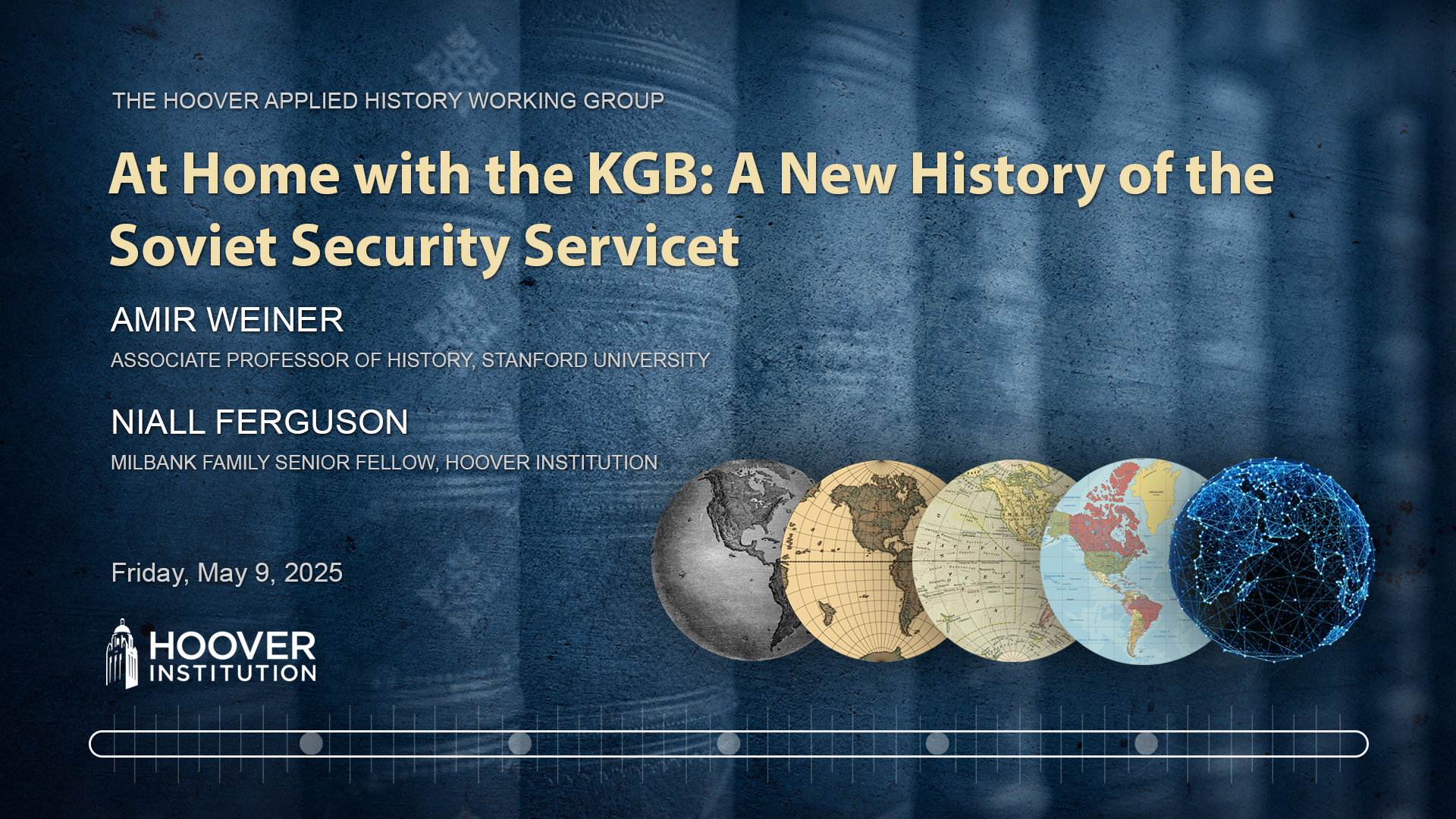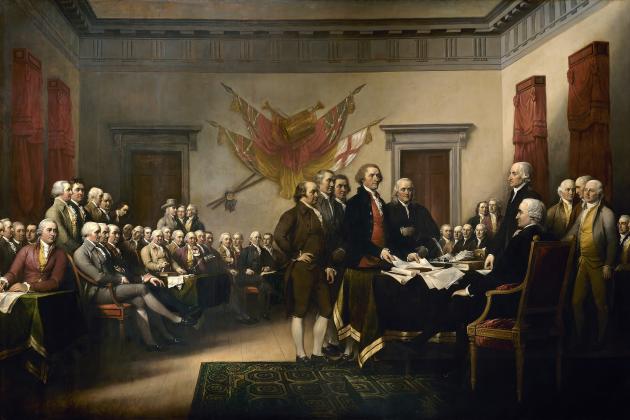The following conversation was part of the KGB and Western Plots Against the Soviet Union event, hosted by the Hoover Applied History Working Group on on Friday, May 9, 2025.
ABOUT THE TALK
Stanford associate professor of history Amir Weiner joins Milbank Senior Fellow Niall Ferguson as part of a discussion of the Hoover Institution Applied History Working Group seminar series, previewing his forthcoming book, At Home with the KGB: A New History of the Soviet Security Service. Weiner examines how the Soviet security service-maintained control after Stalin—not through overt violence, but using methods such as psychological pressure, surveillance, and deeply embedded conspiratorial thinking.
The conversation explores how the KGB adapted, shaped leadership transitions, and ultimately failed to prevent the Soviet collapse—offering fresh insights into the Cold War era and the mindset of its most notorious alumnus, Vladimir Putin.
>> Niall Ferguson: Hello, my name's Niall Ferguson. I'm the Millbank Family Senior Fellow here at the Hoover Institution and I'm also the director of the Applied History Working Group. And today we've had the good fortune of hearing a terrific presentation by our guest and near neighbourhood Professor Amir Weiner, who is a director of the center for Russian East European and Eurasian Studies as well as a professor of history here at Stanford.
Welcome, Amir. You're here to tell us about your new book, or at least a part of the new book. And the book which is coming out next year, will be called At Home with the A New History of the Soviet Security Service. But the subject of your talk today was the KGB and Western plots against the Soviet Union.
Well, everybody knows about the kgb. It's one of the few things that everybody knows about the history of the Soviet Union. And we also feel as if the KGB never went away because, of course, President Vladimir Putin was in his young day, a KGB operative. One of the key points that you're making in your new book is that the KGB's antics abroad, though they were quite successful as espionage weren't decisively in the Cold War.
Ultimately, it didn't save the Soviet Union. But at home, the KGB was highly effective in keeping the system going after the period of Stalinist terror. How did it keep the Soviet Union going and what have you learned from writing this book about the KGB that will change the way we think about it?
>> Amir Weiner: First of all, thanks for having me. The KGB was very intrusive. It simply adjusted. It was continually adopting the new changes and quite successfully when it was told to do so. It was restructured, it was cut to size by Stalin's successors before it made it its huge comeback under Yuri Andropov in the late 60s, early 1970s.
But it started operating new methods, like, for instance, prophylactica, prophylactic measures, which meant trying to nip in the bud problems and troublemakers before they burst on stage. Which means that treating misdemeanors as they occur before they metamorphose into political problems. And in this case, about 330,000 Soviet citizens are subjected to these prophylactic chats with the KGB operatives or their representatives.
It is peaceful, it is not pleasant, it's a psychological terror 101. But it was quite effective in deterring people, shattering social fabric and intimidating them enough that the very small rate of recidivism and holding it quite tight until the very end when the new leadership is beginning to change the system itself.
And then the KGB is Struggling to adjust. Most important to remember. Remember, the KGB never went away. Political police never went away in the transition. Not from Stalin to his successors, not from the Soviet to their Russian Federation successor. Political police was always there.
>> Niall Ferguson: So one point you make is that the KGB contrasted its methods with those of its predecessors, the nkvd, which were notoriously brutal.
The KGB preferred not to use violence, though it certainly always carried the threat of violence. As I was reading some of the interviews that you did with former KGB operatives, I was wondering if they were somewhat whitewashing the role of violence in the period that you're interested in, in the 50s and 60s and 70s.
It does happen. There are cells where people get beaten up and there's a threat, sometimes an explicit threat. You gave the example of Nathan Sharansky, in effect being told you might not leave here alive. Talk about the role of violence in the way the KGB functioned. It was there always as at least a threat, wasn't it?
>> Amir Weiner: It is hanging over constantly the threat of violence. People are afraid when they are summoned to the KGB offices even for these prophylactic chats, as the KGB understands very well, they are shaking in their boots. They use some other language, a little bit rougher language of the reaction of people who are being summoned.
They are aware of this. People are afraid of the kgb. Very few of them are walking nonchalantly and in confidence to the KGB officers. But violence is hardly used. And again, this is not just the KGB whitewashing itself. This is testimonies of people who were so called processed by the kgb, including dissidents.
Now of course, when they are put in prisons, they are being graphed up and that's a different story when they are locked in psychiatric clinics. They are notorious psychiatric clinics, and there's large number of them. This is a different story. But while the KGB directly handles them, violence is almost always off the table and they feel that they don't need it.
>> Niall Ferguson: Now something fascinating that you talked about today is the KGB's predilection for conspiracy theories. And it's as if something happens in 1962 that reactivates the long standing Soviet fear of outside influence. Talk about the events of 1962 and how those events led to a new sense of conspiracy against the Soviet Union from foreign agents.
>> Amir Weiner: 1962 is what I would call the perfect storm from all directions. It is the Cuban Missile crisis that rattled them behind closed doors, of course. It is the bread riots throughout the Soviet Union when Soviet workers are cursing openly the Soviet leadership and becoming more and More violent.
It's the bread riots, national rifts that are coming on surface and of course the Western reaction to it. And I mentioned in this case certain Western publicist that really touched raw nerve with the Soviets. All of this coming together to rattle them and almost forcing them to go back to certain Stalinist ideas of the master plots, conspiratorial plots.
They were never away from it. This is a conspiratorial organization. If you just think about how they came to being. The KGB is born in a conspiracy against its predecessor. The demotion, and dismissal, and execution of Birya. It's their own master plot in which they participate, took active roles.
So they are born in conspiracy and they conspire very often against other parts of the leadership. They are the one behind the dismissal of Nikita Khrushchev in 1964. Without them it couldn't happen. Although they did not orchestrate it. This is an organization that lives breathe and its conspiracies and when it looks around has a lot of reasons to be suspicious.
And I mentioned in my talk earlier, 1956 Hungary that started from a minuscule protest and turned into the toppling down of a communist regime, if only for a few days. But this is an alarming.
>> Niall Ferguson: You talk about an obscure German op ed that becomes a kind of seed of a conspiracy theory.
And I was surprised I hadn't even heard of its author. And talk a little bit about how they found evidence of the conspiracy in of all places, a German foreign policy magazine.
>> Amir Weiner: Well. They do read the Western literature constantly. There are teams of people who were reading these foreign publications.
The interesting part was the KGB colonel who informs his colleagues about it himself was a spy. Although at the time when he's writing the rebuttal and the marching orders to his guys, he's in the Soviet Union. But later we know that he was a spy in a certain capitalist country that they don't specify years later.
So quite likely he also spoke and read the language. I suspect that he was working in Germany. But certainly his rebuttal to Allard von Schaeck was based on very intimate familiarity with the essay. But this is nothing rare to react to Western publications. But this one, I admit threw me off a little bit that they take something that who on earth was reading these publications at the time?
The House and Politik is being read by experts in foreign policy, but it's still in German, but they refer to it, and this comes the slight absurdity as the American magazine House and Politik. So There's a certain parochiality side by side with the knowledge of the familiarity of foreign languages.
>> Niall Ferguson: Speaking of KGB operatives with good German, Vladimir Putin has become the most influential alumnus of the kgb. Do you think your book helps us better understand him? Because he's become one of the great puzzles for Western policymakers who even up until the eve of his all out onslaught on Ukraine was, I think, being misunderstood by supposed experts.
Can we learn a bit more about Putin from understanding the world he came from in your book?
>> Amir Weiner: Yes, by the way, just as an anecdotal, one of the interviewees that quite prominent in my book was a classmate of Putin in the academy. And as he remembers him as a short guy with whiskers who did not socialize with non Russians and does it make for something I don't know, but he doesn't remember him uniquely fondly and.
>> Niall Ferguson: He volunteered at 16, walked into the KGB office and said, where do I join? And they said, that's not how it works.
>> Amir Weiner: Studying Putin is a study of mythology that is very carefully built. I don't know, I cannot vouch for. That's what he said in his so called autobiography, Interviews in First Person, it's called, that came out when he came to power.
It's sort of self aggrandizing and humanizing, someone who the world did not know much about. Certain things that he says there certainly resonate with a lot of the things that we hear about and learn about other KGB officers in terms of the training, in terms of the pride.
He wanted to be a spy. So many of them wanted to be a spy. They want to be a Soviet James Bond. They had their own Soviet James Bond. Here in the west we don't know much, but a guy named Stirly, it's a fictional character that they created in one of the most popular books and TV shows, 17 moments of spring.
So his aspirations, his dreams of being a spy are shared by thousands and thousands of people who wanted to become spies. With one difference. The story of volunteering to the KGB doesn't resonate that well because the KGB was not a volunteer organization. You not offer your services to the KGB.
It is not the CIA or MI6. They came to you. So he says that he wanted to join at the age of 16 and was sent home to study. One of the people I worked with and studied was much the same that also called them, because he called them, he was under suspicion.
And so they studied him a long, long time before they allowed him. And apparently there was reason to be suspicious because later on he's one of those who lead the inside rebellion of Lithuanian KGB officers during glasnost and towards independence. So they have a reason not to take volunteers or wannabe Soviet James Bonds.
>> Niall Ferguson: One last question. This was an organization that was able to keep the Soviet population under tight control, snuff out the dissident movement of the 1970s, and yet at the end it could not stop the Soviet collapse. What's your explanation for its ultimate failure?
>> Amir Weiner: A variety of reasons.
There's not a single one. I would simply say this is an organization that relied on getting its orders from the civilian bosses. And when the party is beginning to lose its grip and beginning to lose its confidence, the KGB is asking for orders, what to do, how to deal with nationalist demonstrations, rough them up, make peace with them, et cetera.
At the beginning they tell them, do what you think. And at a certain point, they don't even answer. So they lose their leadership. And they don't know they are not trained to operate on their own, to take these cataclysmic decision on their own. Second, this is an organization that becomes, for lack of better word, vegetarian.
They don't shed blood during the Soviet era and this is not a recommendation to shed blood, but they forgot how to do it. And the last time that they've done it was in 1962. They participated in these bloody suppression of Novocherkassk, and they vowed never ever to repeat it.
So they are not used to simply shedding blood. And this is detrimental for an organization that is in charge of rescuing, protecting a crumbling organization. Third, they are being swamped by their own conspiratorial thinking that deviates that lead to deviation from focusing on the core real issues that were taking place.
And finally, this is an organization that has become bureaucratized more and more. We rejoice now when we go to the archives. And we don't even know how to handle these myriad of documents on this and that. But the question that we have to ask ourselves, was it too much?
Did they gather so much information that was beyond digestions? What's good for historians was not good for operatives.
>> Niall Ferguson: That's a good note on which to end this conversation. Amir, your book will come out next year at Home with the KGB A New History of the Soviet Security Service.
We'll all look forward very much to reading that. Thanks so much for joining us here at the Applied History Working Group. It was an absolutely fascinating talk and it's really whetted my appetite for the book as a whole. That's it. From the Hoover History working. Applied History working group from me, Niall Ferguson.
We look forward to inviting you back to our seminar series in the next academic year.
ABOUT THE SPEAKERS
Amir Weiner is the Director of the Center for Russian, East European and Eurasian Studies and a Professor of History at Stanford University. He is the author of Making Sense of War, Landscaping the Human Garden, and numerous articles and edited volumes on the impact of World War Il on the Soviet polity, the social history of WWII and Soviet frontier politics. His forthcoming book, At Home with the KGB: A New History of the Soviet Security Service, will be published by Yale University Press in 2026.
Niall Ferguson, MA, D.Phil., is the Milbank Family Senior Fellow at the Hoover Institution, Stanford University, and a senior fellow of the Center for European Studies, Harvard, where he served for twelve years as the Laurence A. Tisch Professor of History. He is also a visiting professor at Tsinghua University, Beijing, and the Diller-von Furstenberg Family Foundation Distinguished Scholar at the Nitze School of Advanced International Studies in Washington, DC. He is the author of several books including the forthcoming second volume of his biography on the late secretary of state Henry Kissinger.



















